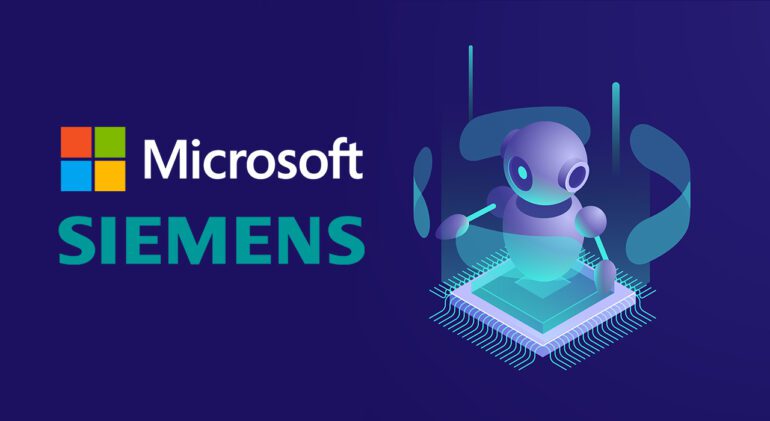TL;DR:
- Siemens and Microsoft deepen collaboration to promote generative AI globally.
- Introduction of Siemens Industrial Copilot to enhance human-machine cooperation in manufacturing.
- Integration of Siemens Teamcenter and Microsoft Teams for streamlined virtual collaboration.
- CEOs of both companies emphasize the potential for AI to revolutionize industries.
- Siemens Industrial Copilot accelerates code development and reduces simulation times.
- Schaeffler AG embraces generative AI for engineering and plans to reduce downtimes.
- Teamcenter for Microsoft Teams to enable inclusive collaboration across product design and manufacturing.
- Siemens will share more details at the SPS expo in November 2023.
Main AI News:
Siemens and Microsoft, two tech giants, are taking their collaboration to new heights, focusing on the global expansion of generative AI benefits across industries. Their first step in this journey is the introduction of Siemens Industrial Copilot, an innovative AI-powered assistant designed to enhance human-machine cooperation in the manufacturing sector. Additionally, they are set to launch an integration between Siemens Teamcenter software, used for product lifecycle management, and Microsoft Teams, which will pave the way for the industrial metaverse, streamlining virtual collaboration among design engineers, frontline workers, and cross-functional teams.
Satya Nadella, Chairman, and CEO of Microsoft, stated, “With this next-generation AI, we have a unique opportunity to accelerate innovation across the entire industrial sector. We’re building on our longstanding collaboration with Siemens and bringing together AI advances across the Microsoft Cloud with Siemens’ industrial domain expertise to empower both frontline and knowledge workers with new, AI-powered tools, starting with Siemens Industrial Copilot.”
Roland Busch, CEO of Siemens AG, echoed this sentiment, saying, “Together with Microsoft, our shared vision is to empower customers with the adoption of generative AI. This has the potential to revolutionize the way companies design, develop, manufacture, and operate. Making human-machine collaboration more widely available allows engineers to accelerate code development, increase innovation, and tackle skilled labor shortages.”
A New Era of Human-Machine Collaboration
Siemens Industrial Copilot promises to usher in a new era of efficiency and productivity across the industrial lifecycle. This cutting-edge tool enables users to swiftly generate, optimize, and debug complex automation code, dramatically reducing simulation times. Tasks that previously took weeks can now be completed in a matter of minutes. The copilot utilizes automation and process simulation data from Siemens’ open digital business platform, Siemens Xcelerator, and enhances it with Microsoft’s Azure OpenAI Service. Importantly, customers retain full control over their data, ensuring it is not used to train underlying AI models.
Siemens Industrial Copilot is set to significantly enhance productivity and efficiency across various industries, including manufacturing, infrastructure, transportation, and healthcare. Numerous AI copilots are already in the pipeline for the manufacturing sector, spanning automotive, consumer packaged goods, and machine building.
Leading automotive supplier Schaeffler AG is among the pioneers in embracing generative AI during the engineering phase. This innovation empowers their engineers to generate reliable code for programming industrial automation systems, such as robots. Furthermore, Schaeffler aims to integrate Siemens Industrial Copilot into its own operations, with the goal of minimizing downtimes and offering this solution to their clients in the future.
Klaus Rosenfeld, CEO of Schaeffler Group, expressed his excitement about this partnership, saying, “With this joint pilot, we’re stepping into a new age of productivity and innovation. Siemens Industrial Copilot will help our team work more efficiently, reduce repetitive tasks, and unleash creativity. We’re excited to partner with Siemens and Microsoft on this project.”
Generative AI Fuels Virtual Collaboration
In December 2023, Teamcenter for Microsoft Teams will be made generally available, marking a significant leap in virtual collaboration across teams. This innovative app leverages the latest advances in generative AI to bridge the gap between functions within the product design and manufacturing lifecycle, connecting frontline workers with engineering teams. By integrating Siemens’ Teamcenter software for product lifecycle management (PLM) with Microsoft’s collaborative platform Teams, data accessibility is enhanced for factory and field service workers. This inclusive approach will enable millions of workers without prior access to PLM tools to seamlessly contribute to the design and manufacturing process as part of their daily work.
Siemens will provide further insights into Siemens Industrial Copilot at the upcoming SPS expo in Nuremberg, Germany, in November 2023. Stay tuned for more exciting developments in the realm of generative AI and industrial collaboration.
Conclusion:
The Siemens-Microsoft partnership’s focus on advancing generative AI in industries signifies a significant shift towards increased efficiency and innovation. The introduction of Siemens Industrial Copilot and the integration of Teamcenter with Microsoft Teams are poised to empower professionals across various sectors, propelling industries into a new era of productivity and collaboration. This collaboration has the potential to reshape the market landscape, as it addresses the growing demand for AI-driven solutions in manufacturing and beyond, positioning both companies as leaders in the evolving industrial technology space.

